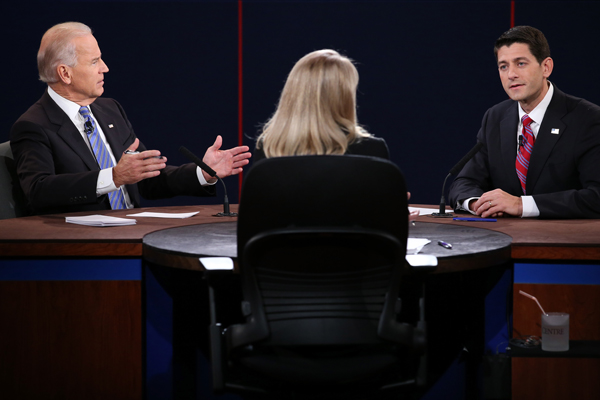3Qs: Candidates spar in aggressive VP debate

Three faculty members with expertise in different fields of study — political analysis, public speaking and presidential debates— assess last night’s debate between Vice President Joe Biden and his Republican challenger, Congressman Paul Ryan.
How well did each candidate perform in terms of laying out his campaign’s positions and how it differs from his opponent? Which candidate was most effective in laying out his campaign’s mission?
Bill Crotty, a professor of political science and expert in American political parties and elections: I had hoped for a campaign that would examine the administration’s at best mixed record and offer reasoned policy options. It is not going to happen.
Vice President Biden overwhelmed an outmatched Rep. Ryan. Biden is a smart and experienced legislator, the former chair of two major Senate committees. He is compassionate, more articulate than his boss and passionately committed to his beliefs. He has been the congressional liaison and workhorse of the administration. It all came into play.
Rep. Ryan is not an especially articulate or compelling debater. He was placed in the awkward position of explaining away his votes as a leader of Tea Party Republicans on Medicare, the budget deficit reduction, jobs, taxes, abortion and most everything that came up. The generality and lack of specifics of the Romney program may actually have worked to his advantage, if anything did. These are policy positions with little appeal to a broad public.
Overall, the vice president was most impressive. It was his job to make up for the president’s weak showing earlier against Romney. He stopped the bleeding — at least until the next presidential debate on Tuesday.
How does Thursday’s debate fit into each campaign’s broader narrative? What did Vice President Biden and Congressman Ryan need to accomplish going into the debate, and to what extent did each man accomplish those goals?
Alan Schroeder, a professor of journalism and expert in televised debates: The vice presidential debate was of particular importance to the Democrats because they needed a change of subject after the president’s widely panned performance in the first debate — and a change of subject is what Joe Biden provided. For the Romney campaign there was less at stake. The interesting question on the Republican side was how this debate would affect Paul Ryan’s long-range prospects. In my opinion, Ryan came across as not quite ready for prime time; from a career standpoint, however, this rising star of the GOP positioned himself favorably for the future.
In post-debate reactions Biden is being criticized for going over the top in his delivery, but all that bluster and laughter and theatricality served a purpose: for most of the evening Biden kept his opponent on defense. This debate focused on Mitt Romney’s proposals more than Barack Obama’s record, which is exactly what the Democrats were hoping for.
What were voters able to learn from each candidate from their behavior and body language? What traits defined each candidate’s performance in the debate?
Greg Goodale, an assistant professor of communication studies and expert in body language and public speaking: Voters should take away from this debate that being aggressive is good for democracy. Both candidates were impressive in their grasp of their party’s version of the facts. And both men spoke with conviction as they rebutted each other’s rhetoric.
Not surprisingly, Vice President Biden was the star of the debate, though perhaps not in a manner that will win over undecided voters. He was bigger-than-life, often using his hand gestures to invade Paul Ryan’s personal space. When listening, his facial expressions displayed a level of disdain for his opponent that is likely to leave voters uncomfortable. That said, he also came across as commanding — a problem that Democrats had to address because of President Obama’s poor debate performance last week. Biden’s mission was to energize the Democratic base. He did that.
Ryan’s mission was to appeal to undecided voters. And he succeeded too. He was calm and cool in the face of contempt and disdain. The problem with this strategy, however, is that few undecided voters watch vice presidential debates. What the Romney campaign aimed to win was the post-debate spin. But because Biden came across as bigger-than-life, the media will focus on the sitting vice president. In other words, neither candidate will be perceived to have won the debate. But those who watched saw a display of policy-knowledge and a commitment to core beliefs that made the audience winners.





